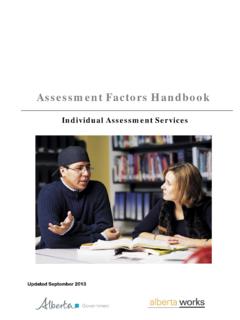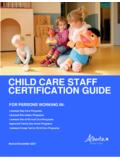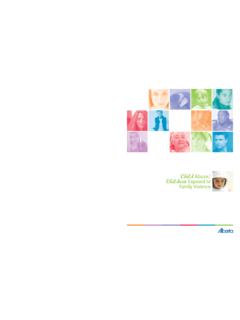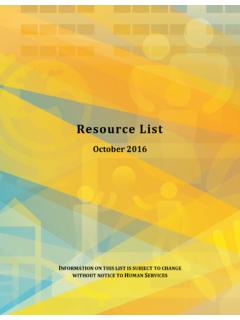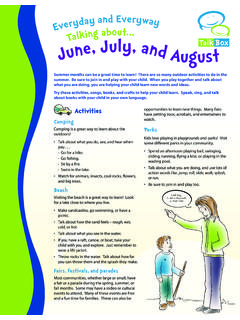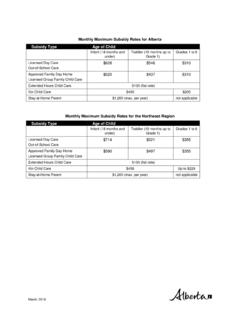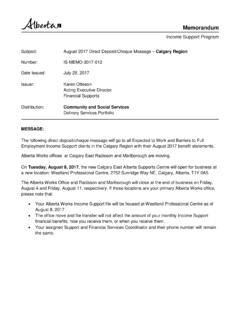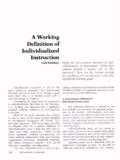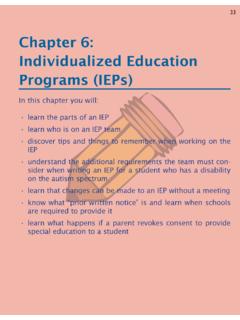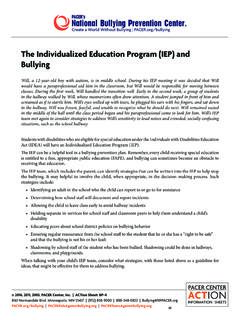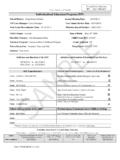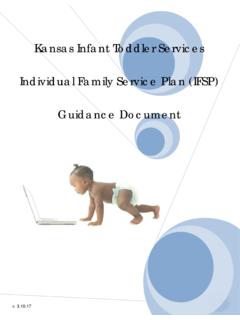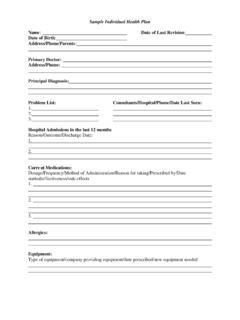Transcription of Guideline for Developing an Individualized Service …
1 Family Support for Children with Disabilities guidelines for Developing an Individualized Service Plan (ISP). for Specialized services March 2013. Table of Contents About this Guide .. 1. Specialized services for Children with Severe Disabilities .. 2. The Specialized services Team .. 3. What is an Individualized Service Plan (ISP)? .. 4. Setting 5. Setting Goals .. 6. Setting Objectives .. 9. Strategies .. 10. Assigning Responsibilities .. 11. Monitoring and Tracking .. 12. Service Integration and Coordination .. 13. Appendix 1 Sample Individualized Service Plan (ISP) 14. Appendix 2 Questions to ask when reviewing an Individualized Service Plan .. 15. ii About this Guide This Guide was created to: identify the key elements of an Individualized Service Plan (ISP) that are required for specialized services highlight the importance of Individualized Service planning support families and their specialized services team to develop an ISP for specialized services Although there may be a common understanding of what is meant by Service planning, individuals and organizations may differ in the language and tools used.
2 The terms used and defined in this guide are for illustration purposes only. Other terms or ways of organizing ISPs are equally acceptable as long as they are clearly communicated and address the key elements that the Family Support for Children with Disabilities (FSCD). program requires in order to approve the ISP. We use the term Individualized Service Plan (ISP) throughout this guide to differentiate this plan for the provision of specialized services from other Service plans such as the Individual Family Support Plan (IFSP) or education based Individualized Program Plan (IPP). March 2013 1 guidelines for Individualized Service Plan (ISP). Specialized services for Children with Severe Disabilities Specialized services are provided to families of children with severe disabilities. They are intended to support guardian(s) in acquiring specific skills and learning strategies to help promote their child's development and participation in activities of normal daily living.
3 Specialized services promote change in the family, child and environment through services and supports that are least intrusive and natural. Positive interaction within routine activities present natural opportunities for the family and child to practice and develop new skills. Through specialized services the family builds their capacity to meet the unique needs of their child. Specialized services involve consultation from one or more of the following health professionals: speech-language pathologist (SLP). occupational therapist (OT). physical therapist (PT). psychologist The health professionals involved in the delivery of FSCD specialized services provide consultation to the Service team and work collaboratively with other Service team members to create and implement the ISP. Specialized services are Individualized to the needs and priorities of the family, complement other supports and services that are in place and are delivered by the members of the specialized services team in a coordinated and integrated fashion.
4 Role of the FSCD Worker The FSCD worker is not directly involved in the implementation of the family's ISP nor do they sign the family's ISP. The FSCD worker reviews the ISP to ensure that it is consistent with the family's identified needs and agreed upon services ; Individualized to reflect the family's needs and priorities and supports integrated and coordinated Service delivery. The FSCD worker also approves that the ISP meets the FSCD program expectations and plays a role on the family's specialized Service team in terms of monitoring how the ISP and services are addressing the child and family's needs. March 2013 2 guidelines for Individualized Service Plan (ISP). The Specialized services Team The specialized services team includes the child, the child's guardian(s), family members or other individuals significantly involved in the family's life, health professionals ( , SLP, OT, PT, or Psychologist) from relevant disciplines and may include non-health professionals ( , behaviour specialist, certified teacher) and aides.
5 Specialized services team members share responsibility for setting, monitoring and accomplishing goals. The specialized services team must identify one member, a health or non-health professional, who will ensure that the ISP is reviewed and updated throughout the year. This member assumes responsibility for the ISP document and not supervision of the other members of the specialized services team. ISPs should be reviewed and updated minimally four times per year. In addition to scheduled reviews it is expected that the ISP be updated as goals are achieved or modified. March 2013 3 guidelines for Individualized Service Plan (ISP). What is an Individualized Service Plan (ISP)? The FSCD program requires that an ISP be developed for each family and child receiving specialized services . The ISP is one of the key pieces of information that the FSCD worker considers when making decisions regarding the provision of specialized services .
6 An ISP must be Individualized to the needs of the family and child, respond to the family's priorities, reflect an integrated and coordinated Service delivery approach and be consistent with the nature of the specialized services approved by the FSCD worker. The ISP is a living document that changes over time to reflect the shifting priorities of the family, the child's developmental stage, transition planning and progress toward goals and objectives. A well devised ISP leads to action and increases the likelihood of success. A clear plan is essential for any Service designed to produce change. ISPs describe (1) the goals or purpose for providing a Service , (2) the steps necessary to achieve the goals and (3) ways of tracking progress towards achieving stated goals. The ISP should be simple, clear and include a description of the following: The priorities of the family ( identification of Service need).
7 The goals of the Service (what you are trying to accomplish);. The objectives (short-term steps) necessary to achieve the goals;. The strategies that will be used to achieve the objectives and goals;. The roles and responsibilities of all specialized services team members;. A plan for monitoring the Service and progress; and A plan for integrating and coordinating services . March 2013 4 guidelines for Individualized Service Plan (ISP). Setting Priorities When creating an ISP it is critical for specialized services team members to have a shared understanding of the strengths, needs and priorities of the family and child. In order for a family to receive specialized services their child must have a severe delay or deficit that results in significant limitations and Service needs in two or more of the following areas: behaviour; communication and socialization skills; cognitive abilities.
8 Physical and motor development; and self-help skills and adaptive functioning. The family identifies their priorities for Service relevant to the areas of critical Service need. FSCD specialized services are intended to strengthen the capacity of the family through change in the family, child and environment. The family is supported to learn new skills and implement strategies that will increase their child's participation in the activities of normal daily living. Why set priorities? The priorities of the family are the foundation on which the ISP is built. When setting priorities the family states the things that they would like to change and establishes their order of importance. When making decisions regarding specialized services the FSCD worker considers whether or not the ISP addresses the priorities identified by the family. Considerations: The family and child's routines and activities The strengths and abilities of the family and the child The impact of the child's disability on the family including individual family members The impact of the child's disability as it relates to their participation in the activities of daily living consider the following areas: communication and socialization skills.
9 Self-help skills and adaptive functioning; physical and motor development; behaviour;. and cognitive abilities. Any upcoming transitions that the family and/or child may be facing March 2013 5 guidelines for Individualized Service Plan (ISP). Setting Goals Setting goals is an important part of Service planning. Goal setting requires focusing on what is important for the family and child. Specialized services goals integrate the perspective and vision of all members of the specialized services team. When setting goals consider the following: goals reflect the priorities of the family;. goals address the child's most immediate and critical areas of Service need;. goals support planning for upcoming life transitions as well as transition to less intrusive services ;. goals are based on assessment of current levels of functioning;. goals are meaningful and realistic; and goals are stated in measureable and observable terms With a focus on the above considerations, the specialized services team will identify the primary goals for the family ( , 3-5 key goals) that clearly describe what the family is trying to accomplish.
10 Goals Reflect the Priorities of the Family A key value of the FSCD Program is to provide family-centred supports and services . FSCD recognizes the family as the primary source of care and support for their child and respects and values a family's ability to care for and promote their child's development. The FSCD Program also recognizes the important role that parents and other family members play in influencing their child's development. The specialized services team must consider how the goals will address the priorities expressed by the family. Goals that address family priorities set the foundation for success. Goals address the child's most immediate and critical Service needs Specialized services are designed to assist families to learn specific skills and apply strategies to increase their child's participation in the activities of daily living.
